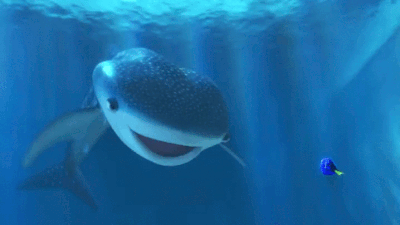Today (February 25, 2015) is the Memorial Day of Shark Girl, Eugene Clark who explored the characteristics of sharks.

Eugenie Clark was born on May 4,
1922, in New York City, USA to a Japanese mother and an American father. He lost his
father when he was 2 years old. His mother's Japanese culture, centred on the
sea, was the reason for his interest in the sea. Eugene's mother taught him to
swim before he was two years old. Eugene will visit the New York Maritime
Museum on Saturdays from the age of 9. He would watch for hours on end hundreds
of fish, sea turtles, and crocodiles swimming in giant tanks. Imagine what it
would be like to swim in a glass tank with sharks. At one point the interest
increased.

He set up a large tank at home
and started raising fish, frogs, small crocodiles and water snakes. By age 13
he had more than a hundred species of fish. It was a dream come true to be an
oceanographer. Eugene holds a bachelor’s degree in zoology. Eugenie worked as
an assistant to an oceanographer. In 1950, he received his doctorate from New
York University. After graduation, he went to Columbia University for a master's
degree. Then after a professor gets a master's degree you will get married and
have children. He said that after spending a whole lot of our time and money,
we would be paralyzed at home without doing any scientific field research. But
he refuted the professor's opinion. After marriage and having four children, he
became a world-renowned shark researcher.

Went to Egypt with a scholarship.
Researched in the Red Sea for 10 months. Collected samples of 300 fish. Three
of the fish were newly discovered, and Eugene's discovery was hailed as the
"Fish Lady" in the press. The book 'Lady with a Spear', based on her
first research experiences in 1953, became an international bestseller.
Translated into many languages. He later wrote a book, The Lady and the Sharks,
in 1969, describing shark habits and marine life.
His focus turned to sharks, which
were considered the most dangerous fish. He went deep into the ocean by scuba
diving and explored sharks. Until then it was believed that sharks had 5 gills.
Eugene found sharks with 6 gills. Sharks do not inhale and exhale rapidly when
swimming. He also found that they slow down and breathe. The fish ‘Moses Soul’
secretes a kind of milk. If sharks move near the smell of highly poisonous
milk, they sharks are in danger. So Moses also discovered the fact that sharks
do not approach sol fish. He also discovered that the whale shark, which lives
at a depth of 3,200 feet, is the largest of the fish.

At a time when sharks were
thought to be able to lay eggs and hatch, he discovered that there were 300
cubs in the womb of a whale shark. Not all sharks are as dangerous as humans
think. Of the 350 species of sharks, only 10 are endangered. In 40 years of
research, he has let the world know that everything else is mediocre. Eugene has
researched 70 times in total, going as deep as 12,000 feet. Sharks have the
most beautiful structure in nature. Have lived on this earth for 200 million
years. When looking at sharks in the deep sea, Eugene says, ‘I am thrilled to
have the opportunity to see, admire and research these beautiful creatures.

He set up the Ocean Laboratory
(MOT) in Florida, which is considered to be the laboratory for today's valuable
marine life, and continued his research. At the time, the company was the only
privately funded researcher. Today it operates as a full-time research centre
with research projects with 24 multidisciplinary research projects, and the
academy operates with a mod fish gallery for the general public. He joined the
University of Maryland in 1968 as a professor. He has authored 3 books, 80
research articles, and 70 articles in journals. He has lectured at 60 American
universities and 19 foreign universities. He has appeared in 50 television
documentaries.

In honour of Eugenie, who made
numerous discoveries during her lifetime, she named 4 sea creatures. In
recognition of her work, the National Geographic Society, the Explorers Club,
the American Maritime Society, the American Literal Society, and the Female
Geologists' Association have presented their gold medals. Eugene did not stop
his research even after retiring. At age 82, he was diagnosed with lung cancer.
Still, he was doing his job with the mindset. After celebrating his 87th
birthday, he went to sea at a depth of 900 feet. At age 88, he set sail.
Eugene, who fought bravely for more than 70 years and lived a full life in a
field where only men were involved, battled cancer for 10 years.
Source By: Wikipedia
Information: Dr. P. Ramesh, Assistant
Professor of Physics, Nehru Memorial College, Puthanampatti, Trichy.
Get information like this
https://t.me/joinchat/jpqj3jQLN51kYTk9
Join Telegram Group.
https://chat.whatsapp.com/FisIzCe4Br2CRgxAiicUnf
Join WhatsApp Group
Thanks.
Also, Read
🛑👍 CSIR-NET Physics Materials and Problems
🛑📕 21 GB and Hundreds of Physics E-Books Collection.
🛑🛥️ How does an Electric Motor work? (DC Motor).
🛑🤹♂️ Science Academies' Summer Research Fellowship Programme for Students and Teachers 2022.
🛑🔌 How does a Transformer work - Working Principle electrical engineering.
🛑🎙️ Transistors Explained - How transistors work.
🛑🔥⚡ How Thermocouples Work - basic working principle.
🛑🔌 Voltage Explained - What is Voltage? Basic electricity potential difference
🛑🔌 What is CURRENT– electric current explained, electricity basics.

.jpeg)
.png)
.jpg)
No comments:
Post a Comment